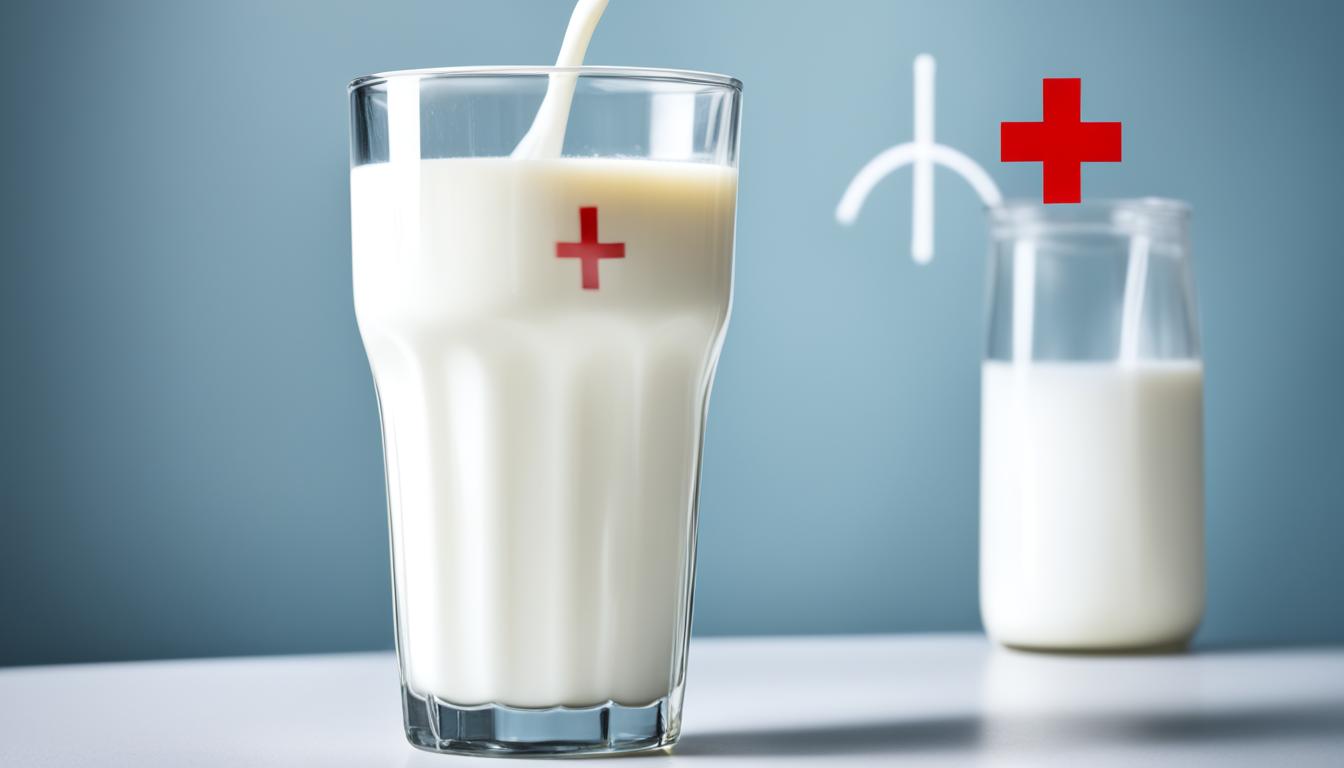Food allergy happens when the immune system reacts badly to certain foods. Cow’s milk protein allergy (CMPA) is one example. It happens when the body doesn’t like proteins in cow’s milk. This can cause problems in the skin, lungs, and gut, leading to various issues.
CMPA shows up in different ways. It can cause eczema, lip and face swelling, trouble breathing, or tummy problems like diarrhea and vomiting. Some might even see blood in their stools. In bad cases, CMPA can cause anaphylaxis shock. This is very serious and needs quick medical help.
One way to lower CMPA’s chance is to just breastfeed babies for their first six months. But if you think your child might have CMPA, talk to a doctor. They might do some tests like a skin test, a blood test, or an oral food challenge to check for CMPA.
If CMPA is diagnosed, the main treatment is to stop eating or drinking milk or dairy products. Babies can use special formula. Some rare cases might need to look into stem cell therapy. But, we still need more research to know if this really helps.
Key Takeaways:
- Food allergy is an adverse reaction of the immune system to certain foods.
- Cow’s milk protein allergy (CMPA) is a type of food allergy that occurs when the immune system reacts to proteins found in cow’s milk.
- CMPA can lead to symptoms such as eczema, swelling, difficulty breathing, diarrhea, vomiting, and blood in stools.
- Anaphylaxis shock is a severe and life-threatening complication of CMPA.
- Diagnosing CMPA requires consultation with a doctor and may involve tests such as a skin prick test, blood test, or oral food challenge.
- Treatment options for CMPA include avoiding cow’s milk protein, using specialized formulas, and in some cases, stem cell therapy.
Common Symptoms and Complications of CMPA
Cow’s milk protein allergy, or CMPA, shows in many ways. It can lead to serious problems. Knowing the signs of CMPA is very important. This lets doctors give the right care. Here are the main signs and troubles of CMPA:
Milk Allergy Symptoms
- Eczema: People with CMPA may get itchy, red, and dry skin, which is eczema.
- Swelling of Lips and Face: Milk protein allergies can make lips and faces swell up.
- Difficulty Breathing: Breathing problems, like wheezing, might occur in some people with CMPA.
- Diarrhea: CMPA can cause stomach upsets, like lots of loose stools.
- Vomiting: Throw up after drinking milk can happen, especially in babies and kids.
- Blood in Stools: In rare cases, blood in poop might show severe gut issues from CMPA.
Anaphylaxis Shock
Anaphylaxis shock is a really bad allergic reaction. Some CMPA cases can cause this if milk protein is eaten. Anaphylaxis starts suddenly with things like no breath, fast heart, dizziness, and passing out. Quick medical help is must to avoid big risk or death.
Growth Failure in Milk Allergy
Not growing like they should can happen in kids with CMPA. They have trouble using food and can’t grow right. Finding and treating CMPA early is key for best growth and health.
Learning about CMPA’s signs and risks helps spot and treat it early. Next, we will see how doctors find and treat CMPA.
Diagnosis and Treatment of CMPA
Diagnosing cow’s milk protein allergy (CMPA) is key to keeping it under control. If you suspect CMPA in your child, see a doctor who knows about allergies. The doctor will look at your child’s signs and past health. They might suggest some tests to be sure:
- Skin prick test: A tiny bit of cow’s milk protein is put on the skin then pricked to let it in. A red bump could show if your child is allergic.
- Blood test: This test checks for specific cow’s milk protein antibodies in the blood. High levels mean an allergic response.
- Oral food challenge: Your doctor might also recommend trying cow’s milk protein to see if there’s a reaction. They’ll watch closely during this challenge.
After finding out it’s CMPA, the main focus is treatment. The key treatment is avoiding cow’s milk protein. This means cutting out dairy like milk, cheese, yogurt, and butter. Check food labels well, as milk can hide in many items.
If staying away from cow’s milk protein is hard, special baby formulas exist. These are safe and provide needed nutrients. They don’t have cow’s milk protein, often using special proteins that are safer for kids with allergies.
It’s good to know that stem cell therapy for CMPA is still being studied. Though it could be a treatment in the future, we need more studies to know for sure. This includes finding how well it works and its safety.
Conclusion
Cow’s milk protein allergy (CMPA) happens when the body’s defense system reacts to proteins in cow’s milk. People with CMPA might show signs like eczema, swollen lips, trouble breathing, or stomach issues. In serious cases, it leads to anaphylaxis, a dangerous condition.
To find out if you have CMPA, you need to see a doctor who might do tests like a skin prick or blood test. Once diagnosed, you have to avoid milk products. For babies, there are special formulas. Also, there’s ongoing study to see if stem cell therapy can help treat CMPA.
CMPA is a serious food allergy that impacts those allergic to cow’s milk. It’s crucial for them to get the right diagnosis and treatment from healthcare providers. While staying away from milk and using special formulas are common, we’re also looking into new treatments like stem cell therapy. Research in the field of medicine offers hope for better care and life for CMPA patients.

